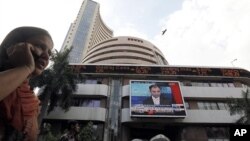In India, the launch of a new share index of companies which meet the Islamic legal code has opened new investment opportunities for Muslims. India is a predominantly Hindu country, but it has one of the largest Muslim populations in the world.
India's stock market has grown rapidly in recent years. But trading in stocks has posed a problem for Muslims, because of restrictions imposed by Islamic law, which does not allow investment in companies that sell goods such as alcohol and tobacco, or those which charge interest.
Now a new share index launched by the Bombay Stock Exchange has identified stocks which are compliant with Islamic law.
The stocks were chosen with the help of a Mumbai-based Islamic finance company, Taqwa Advisory and Shariah Investment Solutions.
The director of research and operations at TASIS, Shariq Nisar, says the index, called BSE TASIS Sharia 50, will make it possible for Muslims to invest their money in the stock market without violating Sharia investment guidelines.
"It will create a market for Indian Muslims," said Nisar. "We can provide opportunity to domestic investors so that they can invest their money without falling foul of their ethical and religious requirement. A lot of Muslim investors who could have invested their money in stock market and benefited from it, they were not having this opportunity earlier."
The stocks will be reviewed every month to ensure that they are compliant with Islamic law. The Bombay Stock Exchange has many such companies, including some of India's largest, such as Reliance Industries Ltd.
There are more than 150 million Muslims in India, accounting for about 13 percent of the country's population. But several studies have shown that many of them were excluded from the country's formal financial sector, because of Islamic restrictions.
Nisar says there were very limited investment avenues for Muslims.
"These people were just keeping the money under their pillows," said Nisar. "Many were investing either in gold or in real estate."
The new index will also help to attract Muslim investors in the Middle East and other countries who want to benefit from India's fast-growing economy.
India's Bombay Stock Exchange Launches Index for Muslims




